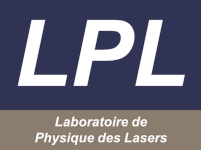PhD position in Ultra-precise Mid-Infrared Molecular Spectroscopy
Post: PhD position in Ultra-precise Mid-Infrared Molecular Spectroscopy
Location: Laboratoire de Physique des Lasers, CNRS-Université Sorbonne Paris Nord Villetaneuse, France
Team: Metrology, Molecules and Fundamental Tests
Supervisors: Pr Anne Amy-Klein
Co-supervisors: B Darquié – M Manceau
Contract: Fixed Term, 36 months, starting in autumn 2025 – Funding already secured
Internship Description:
The PhD student will participate in cutting-edge experiments aimed at ultra-precise measurements of rovibrational molecular transitions and dedicated to measuring/constraining the potential time variation of the proton-to-electron mass ratio (µ), a fundamental constant of the standard model (SM). Such variations, if detected, would be a signature of physics beyond the SM, providing insights into the nature of dark matter and dark energy. The idea here is to compare molecular spectra of cosmic objects with corresponding laboratory data. The experimental setup is based on quantum cascade lasers (QCLs) locked to optical frequency combs, with traceability to primary frequency standards, a breakthrough technology developed at Laboratoire de Physique des Lasers (LPL), allowing unprecedented spectroscopic precision in the mid-infrared range.
This internship will focus on measuring mid-infrared molecular transitions of methanol (CH3OH), a molecule known for its enhanced sensitivity to changes in µ. The student will set up and stabilize a new QCL in a spectral region hosting particularly relevant transitions. The work will involve achieving sub-Doppler spectroscopic resolution to reach target laboratory frequency accuracies of ~100 Hz needed for comparisons with astronomical observations. This activity is part of the ANR Ultiµos project, a collaborative effort which seeks to refine current constraints on the possible variation of µ which involves leading research institutions, including Laboratoire Kastler Brossel (LKB, L. Hilico) and MONARIS (C. Janssen) at Sorbonne Université. The three partners of the Ultiµos consortium will collaborate to conduct measurements in methanol and other species such as ammonia (NH3) in different spectral windows, to identify transitions as targets for future Earth/space comparison campaigns, which could further tighten constraints on variations of µ. Other collaborators, such as Vrije Universiteit Amsterdam and Onsala Space Observatory, will provide theoretical and observational/astronomical support to complement the experimental efforts.
The proposed laser technology is also crucial for the ongoing development at LPL of a new-generation molecular clock specifically designed for precision vibrational spectroscopy of cold polyatomic molecules. The student may therefore be involved in first precise spectroscopic measurements on cold molecules produced at ~1 K in a novel cold molecule apparatus. Combining frequency metrology and cold molecule research as the potential to bring even more stringent constraints on a drifting-µ, and opens possibilities for using polyatomic molecules to perform other fundamental tests, including the measurement of the energy difference between enantiomers of a chiral molecule, a signature of parity (left-right symmetry) violation, and a sensitive probe of dark matter.
Keywords: fundamental constants, standard model, precision measurements, ultra-high-resolution spectroscopy, frequency metrology, quantum cascade lasers, frequency comb lasers, cold molecules, molecular physics, quantum physics, astrophysics, optics & lasers, vacuum, electronics, programming & simulation
Relevant publications from the team: Tran et al, APL Photonics 9, 3, (2024); Fiechter et al, J Phys Chem Lett 13, 42 (2022); Santagata et al, Optica 6, 411 (2019); Cournol et al, Quantum Electron. 49, 288 (2019), arXiv:1912.06054; Tokunaga et al, New J. Phys. 19, 053006 (2017); Argence et al, Nature Photon. 9, 456 (2015), arXiv:1412.2207.
Requirements: The applicant should be doing its master studies in a relevant area of experimental physics or chemical physics: atomic, molecular and optical physics, spectroscopy, lasers, quantum optics. Interested applicants should email a CV, a brief description of research interests and the contact details of 2 referents to M. Manceau and/or B. Darquié.
Funding already secured. Potential applicants are also welcome to apply to a master internship position currently available in the same group on a similar subject that could constitute an ideal training for the PhD.
You will find the job description here
